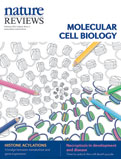|
Advertisement | |||||||||||||||||||||||||||||||||||||||||||||
| |||||||||||||||||||||||||||||||||||||||||||||
| TABLE OF CONTENTS | |||||||||||||||||||||||||||||||||||||||||||||
| February 2017 Volume 18 Number 2 | |||||||||||||||||||||||||||||||||||||||||||||
2015 2-year Impact Factor 38.602 Journal Metrics 2-year Median 30 | In this issue
| ||||||||||||||||||||||||||||||||||||||||||||
| |||||||||||||||||||||||||||||||||||||||||||||
 | |||||||||||||||||||||||||||||||||||||||||||||
| Advertisement | |||||||||||||||||||||||||||||||||||||||||||||
| |||||||||||||||||||||||||||||||||||||||||||||
| Advertisement | |||||||||||||||||||||||||||||||||||||||||||||
| |||||||||||||||||||||||||||||||||||||||||||||
| |||||||||||||||||||||||||||||||||||||||||||||
| Advertisement | |||||||||||||||||||||||||||||||||||||||||||||
| |||||||||||||||||||||||||||||||||||||||||||||
| REVIEWS | Top | ||||||||||||||||||||||||||||||||||||||||||||
| The nuclear pore complex: understanding its function through structural insight Martin Beck & Ed Hurt p73 | doi:10.1038/nrm.2016.147 Nuclear pore complexes (NPCs) are large protein assemblies that form channels in the nuclear envelope and constitute major routes for nucleocytoplasmic communication. Insights into the complex structure of NPCs provide the basis for understanding their functions and reveal how the dysfunction of their structural components, nucleoporins, contributes to human disease. Abstract | Full Text | PDF | Supplementary information | |||||||||||||||||||||||||||||||||||||||||||||
Metabolic regulation of gene expression through histone acylations Benjamin R. Sabari, Di Zhang, C. David Allis & Yingming Zhao p90 | doi:10.1038/nrm.2016.140 In addition to acetylation, eight types of structurally and functionally different short-chain acylations have recently been identified as important histone Lys modifications: propionylation, butyrylation, 2-hydroxyisobutyrylation, succinylation, malonylation, glutarylation, crotonylation and β-hydroxybutyrylation. These modifications are regulated by enzymatic and metabolic mechanisms and have physiological functions, which include signal-dependent gene activation and metabolic stress. Abstract | Full Text | PDF | |||||||||||||||||||||||||||||||||||||||||||||
The roles of RNA processing in translating genotype to phenotype Kassie S. Manning & Thomas A. Cooper p102 | doi:10.1038/nrm.2016.139 Genetic variants can produce phenotypic traits through effects on RNA processing, including effects on pre-mRNA splicing, 3' end formation, and RNA stability, localization, structure and translation efficiency. Abstract | Full Text | PDF | |||||||||||||||||||||||||||||||||||||||||||||
| Histone variants on the move: substrates for chromatin dynamics Paul B. Talbert & Steven Henikoff p115 | doi:10.1038/nrm.2016.148 Histone variants are typically incorporated into chromatin independently of DNA replication and modify chromatin properties. Recent studies have elucidated how particular histone variants are substrates of histone chaperones, chromatin remodellers and histone-modifying enzymes, thereby modifying DNA replication and repair, transcription and chromatin packaging. Abstract | Full Text | PDF | Supplementary information | |||||||||||||||||||||||||||||||||||||||||||||
| PERSPECTIVES | Top | ||||||||||||||||||||||||||||||||||||||||||||
| TIMELINE Necroptosis in development, inflammation and disease Ricardo Weinlich, Andrew Oberst, Helen M. Beere & Douglas R. Green p127 | doi:10.1038/nrm.2016.149 Several years after the characterization of the role of receptor-interacting serine/threonine protein kinase 1 (RIPK1) in cell survival, inflammation and disease, RIPK1 was implicated in the regulation of a newly identified type of cell death known as necroptosis. This Timeline article describes the discoveries that shed light on the roles of RIPK1, RIPK3, mixed-lineage kinase domain-like protein (MLKL) and other regulators of necroptosis in controlling cell fate. Abstract | Full Text | PDF | |||||||||||||||||||||||||||||||||||||||||||||
| |||||||||||||||||||||||||||||||||||||||||||||
| *2015 Journal Citation Reports (Thomson Reuters, 2016) |
You have been sent this Table of Contents Alert because you have opted in to receive it. You can change or discontinue your e-mail alerts at any time, by modifying your preferences on your nature.com account at: www.nature.com/myaccount For further technical assistance, please contact our registration department For print subscription enquiries, please contact our subscription department For other enquiries, please contact our feedback department Nature Publishing Group | One New York Plaza, Suite 4500 | New York | NY 10004-1562 | USA Nature Publishing Group's worldwide offices: Macmillan Publishers Limited is a company incorporated in England and Wales under company number 785998 and whose registered office is located at The Campus, 4 Crinan Street, London, N1 9XW. © 2017 Nature Publishing Group, a division of Macmillan Publishers Limited. All Rights Reserved. |
 |









No comments:
Post a Comment